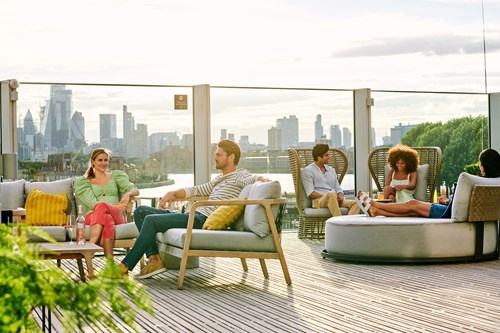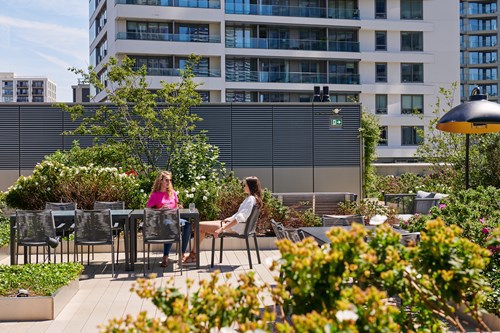YOHANNAH CAUSSYRAM
Canary Wharf has spent the past three decades exploring new ways to make its destination as environmentally friendly and sustainable as possible. The Estate’s open spaces and buildings prioritise conservation, biodiversity, and a connection with nature. This strategy is helping to minimise residents’ and visitors’ impacts on the surrounding environment and prepare for potential challenges in the future.
The Estate has kept community as the core focus of all of its efforts to proactively address the climate crisis, and it encourages local residents and visitors to take part to make an even bigger impact.
Here are the best sustainable habits to adopt in your home to help preserve the magnificent natural spaces around you.

![]()
Reduce, Reuse, Recycle
The phrase “reduce, reuse, recycle” is everywhere nowadays, and it offers simple yet valuable rules on how to live an eco-friendly lifestyle. However, it’s important to have a practical understanding of how to put these tips into action to build a more sustainable future.
‘Reduce’ refers to lowering your consumption of products, services and energy however you can minimise the need for a resource before it’s created. You can reduce your consumption by:
- Turning lights and appliances off when not in use
- Refusing single-use plastic items like water bottles, straws, and disposable personal care products
- Choosing high quality, minimally packaged items that will last
Actions like opting for second-hand furniture, clothing, cars, tools, and equipment can also lower demand for resources that can damage the planet during their extraction.
‘Reuse’ promotes the idea of reusing or upcycling materials that would otherwise be diverted to landfills. For instance, you could:
- Clean glass jars and use them to store food and household items
- Shop at thrift or vintage stores and attend events such as clothes swaps
- Use waste materials like plastic bottles and cardboard boxes creatively around your home in craft and DIY projects
YouTube and Pinterest offer excellent inspiration for these projects!
The final part, ‘Recycle’, encourages anyone who is interested in Canary Wharf sustainability to recycle qualifying waste materials. You can recycle:
- Paper and cardboard
- Certain types of plastics
- Glass
- Aluminium and tin cans
- Batteries
Zero Waste Living
Zero waste living is a trendy and highly effective way to manage the amount of waste you produce. Reducing your waste and opting for natural, biodegradable materials where possible limits the volume of waste that reaches landfills, oceans, water bodies, and natural environments. Plus, it helps to prevent this waste from releasing methane and heating the planet further as it breaks down.
The zero-waste movement covers various areas, including food, personal hygiene products, and packaging. Instead of using disposable items such as plastic toothbrushes, sponges, plastic sandwich bags, cotton pads, and plastic packaging for cosmetics and food, the movement encourages the use of materials and products that can either be reused in the long run, such as silicone food storage solutions and wooden dish brushes, or composted after use, such as bamboo toothbrushes and biodegradable packaging.
These items can be considered a long-term investment in building sustainable habits, as they can sometimes cost a little more initially than their disposable counterparts. However, they also tend to last longer than disposable items. This helps you to cut down your expenses and your waste in the long term. Look for well-made items made of glass, stainless steel, silicone, sustainably grown wood and bamboo, copper, and other materials designed to last a lifetime.

Sustainable Transportation
Using sustainable methods of transportation such as walking, jogging, biking, carpooling, or public transport can vastly reduce your personal carbon footprint. The fewer personal vehicles on the road, the fewer greenhouse gas emissions produced over time.
If you do need to use your personal vehicle for trips, try to plan and travel strategically to limit your fuel consumption and CO2 emissions. You can also explore possible remote work opportunities. Vertus’ apartments offer on-site remote work facilities and high-speed broadband that makes working from home an excellent option.

Sustainable Food Choices
Certain foods like dairy products, red meat and fish produce significantly higher emissions during production and shipping. In contrast, whole grains, legumes, pulses, and local and seasonal fruits, herbs and vegetables have far lower emissions.
You can make more sustainable food choices by doing the following:
- Reduce your meat and dairy consumption wherever possible
- Support local farmers and organic and regenerative agriculture
- Eat seasonally
Recycling and Sustainable Habits at Vertus
Vertus aims to be a pioneer of the London sustainability movement, and we have designed our exclusive Canary Wharf properties to reflect this ethos. As a Vertus resident, you will have access to a range of labelled bin chutes which you can use to dispose of your waste in the most appropriate way.
Once your waste is disposed of, it will get diverted to the correct facility to be processed as efficiently as possible. Our unique system makes it easier to live sustainably in the heart of the city, without any interruption to your daily life.
Live An Eco-Conscious Life At Vertus
The future of Canary Wharf sustainability looks bright. Especially with new technologies and initiatives like the Eden Project Partnership, 14 electric car charging points, Breaking the Plastic Habit, and Water Refill Stations helping residents to live more environmentally conscious lives.

The Estate is currently home to more than 16 acres of pristine gardens, parks, and waterside spaces, which play a crucial role in supporting residents’ mental and physical health. Initiatives like the ones mentioned above help to preserve these green and blue spaces, attract, and nurture nature, and keep Canary Wharf vibrant and attractive to residents and visitors alike.
Ready to move in and adopt sustainable living habits? Contact Vertus for the keys to a more eco-conscious life.

